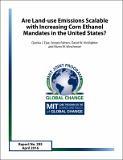Are Land-use Emissions Scalable with Increasing Corn Ethanol Mandates in the United States?
Author(s)
Ejaz, Qudsia J.; Paltsev, Sergey; Kicklighter, David W.; Winchester, Niven W.
DownloadMITJPSPGC_Rpt295.pdf (2.256Mb)
Metadata
Show full item recordAbstract
In response to the Renewable Fuel Standard, the U.S. transportation sector now consumes a substantial amount (13.3 billion gallons in 2010) of ethanol. A key motivation for these mandates is to expand the consumption of biofuels in road transportation to both reduce foreign oil dependency and to reduce greenhouse gas (GHG) emissions from the consumption of fossil fuels in transportation. In this paper, we present the impacts of several biofuels expansion scenarios for the U.S. in which scaled increases in the U.S. corn ethanol mandates are modeled to explore the scalability of GHG impacts. The impacts show both expected and surprising results. As expected, the area of land used to grow biofuel crops increases with the size of the policy in the U.S., and some land-use changes occur abroad due to trade in agricultural commodities. Because the land-use changes happen largely in the U.S., there is an increase in U.S. land-use emissions when natural lands are converted to agricultural use in the policy scenarios. Further, the emissions impacts in the U.S. and the rest of the world in these scenarios, including land-use emissions, scale in direct proportion to the size of the U.S. corn ethanol mandates. On the other hand, the land-use emissions that occur in the rest of the world are disproportionately larger per hectare of change due to conversions of more carbon-rich forests to cultivate crops and feed livestock.
Date issued
2016-04Publisher
MIT Joint Program on the Science and Policy of Global Change
Citation
Report 295
Series/Report no.
MIT Joint Program Report Series;295